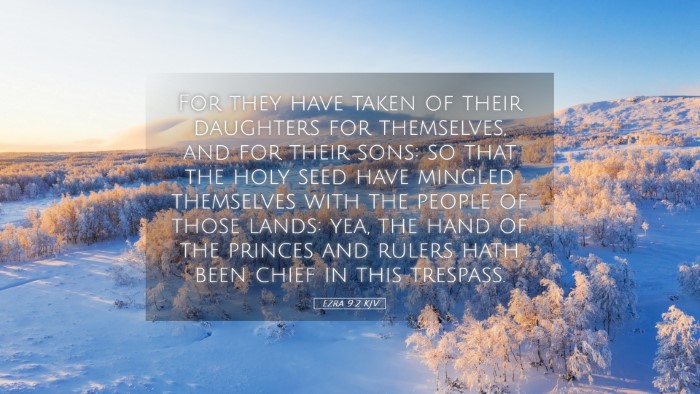Old Testament
Genesis Exodus Leviticus Numbers Deuteronomy Joshua Judges Ruth 1 Samuel 2 Samuel 1 Kings 2 Kings 1 Chronicles 2 Chronicles Ezra Nehemiah Esther Job Psalms Proverbs Ecclesiastes Song of Solomon Isaiah Jeremiah Lamentations Ezekiel Daniel Hosea Joel Amos Obadiah Jonah Micah Nahum Habakkuk Zephaniah Haggai Zechariah MalachiEzra 9:2
Ezra 9:2 KJV
For they have taken of their daughters for themselves, and for their sons: so that the holy seed have mingled themselves with the people of those lands: yea, the hand of the princes and rulers hath been chief in this trespass.
Ezra 9:2 Bible Commentary
Commentary on Ezra 9:2
Ezra 9:2 states:
"For they have taken of their daughters for themselves, and for their sons: so that the holy seed have mingled themselves with the people of those lands: yea, the hand of the princes and rulers hath been chief in this trespass."
Historical Context
Ezra’s concern in this verse emerges from the returned exiles' unfaithfulness in intermarrying with the peoples surrounding Jerusalem. This practice posed significant theological and spiritual dangers, as it threatened the purity of the Israelite community and their covenantal relationship with God. The Jews faced the challenge of remaining distinct in a post-exilic society where the influence of foreign nations was profound.
Reasons for Concern
- Spiritual Dilution: The concern over intermarriage relates to the broader theme of spiritual fidelity in the Hebrew Bible. Such unions could lead to the adoption of pagan practices, influencing the worship and devotion of God's people away from Yahweh.
- Covenantal Identity: The term "holy seed" underscores the unique identity of the Israelites as God’s chosen people. The mingling with other nations represented a risk to this divine heritage, prompting Ezra's lamentation over their actions.
- Leadership Failure: Ezra points out that the rulers and princes were complicit in these practices, highlighting the importance of leadership integrity in spiritual matters. The failure of these figures to guide the people toward obedience to God’s laws exacerbated the problem.
Insights from Public Domain Commentaries
Matthew Henry's Commentary
Matthew Henry reflects on the gravity of Ezra’s concerns about the intermarrying of the holy seed with foreign nations. He emphasizes the following points:
- Defilement of the Holy Seed: Henry stresses that the Jewish people, called out to be a holy nation, jeopardize their distinctiveness through intermarriage, hence risking the very essence of their identity.
- Corporate Responsibility: He argues that the sin was communal, implicating not only individuals but also leaders. This underscores the weight of collective accountability before God and the necessity of righteous leaders who uphold divine standards.
- God’s Judgments: Henry notes that God’s judgment against such mixed alliances throughout Israel’s history serves as a warning to the current generation. Events are often cyclical, and the consequences of disobedience are historically significant.
Albert Barnes' Notes on the Bible
Albert Barnes provides practical applications regarding the spiritual implications of this text:
- Moral Integrity: Barnes emphasizes maintaining moral and spiritual integrity when engaging with those outside one’s faith. He surmises that while interaction is essential, relationships should never undermine one’s faith.
- Spiritual Leadership: He discusses the influence leaders have over the congregation, drawing attention to the necessity for leaders to exemplify faithfulness to God to avoid leading others into sin.
- Call to Repentance: Barnes suggests that this passage invites contemporary believers to reflect on their own actions, calling for self-examination and a return to spiritual fidelity.
Adam Clarke's Commentary
Adam Clarke's insights center around the implications of Ezra's lamentation:
- Compromise of Faith: Clarke portrays the marriages as marking a compromise of faith where the Israelites silently participate in surrounding cultures’ idolatry, impacting their worship practices and fidelity to Yahweh.
- Importance of Holiness: He mentions holiness as fundamental to a believer’s life, noting that God's people are called to live as a separate entity, reflecting His character and values.
- Historical Reference: Clarke brings historical context into the discussion, linking Ezra’s lament to the warnings of the past, citing how previous generations suffered because of similar sins of intermarriage.
Theological Implications
Ezra 9:2 has lasting theological ramifications that extend beyond the historical narrative:
- Divine Holiness: The verse emphasizes God's command for holiness among His people, demanding that they remain untainted by worldly influences.
- Community and Identity: The verse speaks to the importance of community identity. The Israelites' unity and distinctiveness were central to their mission as God’s people.
- Covenantal Faithfulness: It serves as a reminder of the covenant relationship with God, emphasizing that faithfulness plays a crucial role in the blessings bestowed upon them.
Application for Today’s Believers
This verse invites believers today to consider the implications of their alliances and relationships:
- Faith-Based Decisions: In choosing relationships, Christians are called to ensure that their bonds encourage spiritual growth and do not compromise their witness.
- Leadership Integrity: Those in positions of authority should evaluate their influence and strive for holiness, being examples of righteousness in all their dealings.
- Community Dynamics: Faith communities today must engage in self-reflection and corporate accountability to remain faithful to God and uphold His teachings in a diverse and often conflicting society.


